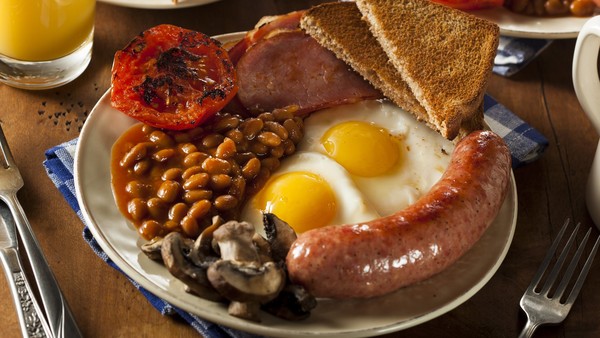Sausages have a place at the table as part of a balanced diet
All reports about food and health should start with the same instruction: if you enjoy recreational worrying, read on. If you are seeking sensible advice on how to eat, skip to the end, which will almost certainly say most things are OK in moderation.
This week the World Health Organisation published a report conclusively linking processed meats with colorectal cancer. Bacon, ham, sausages and other smoked, cured or salted charcuterie are “group 1” products with the highest likelihood to cause cancer, according to a “meta review” of scientific research by the International Agency for Research on Cancer. This is a category that your breakfast banger now shares with tobacco, alcohol, asbestos and radioactive materials such as uranium.
This has naturally caused consternation at the breakfast table, pointing to the conclusion that feeding your child a bacon roll equates to stirring plutonium into their cornflakes.
The WHO draws on global research and issues its findings worldwide. This is logical in a macro sense. If the entire population of the globe could be persuaded to cut its intake of a range of preserved meats we would see a fall in the numbers dying of colorectal cancers. The problem is that the information is meaningless to the consumers it is supposed to help.
Most of the figures in the report refer to the amount of preserved meat eaten “daily”. I am already wondering about the kind of person who eats bacon every day. Then I am trying to imagine the kind of person who did not give up bacon when we were told its fat was laden with cholesterol and likely to stop our hearts. The same kind of person who did not give up bacon when we were told its salt content would hasten our deaths by boosting blood pressure to the point of apoplexy. The same kind of person who ignored the fact that smoked products have long been acknowledged as carcinogens.
The global statistics do not identify whether it is the meat that is carcinogenic, the nitrates used in preservation, products of fermentation or smoke or salt. Dietary fibre is known to reduce the incidence of colorectal cancers, so is a wholemeal bacon sarnie OK? Is a Spanish Ibérico ham, made purely of organic pork and salt, carcinogenic to the same degree as a supermarket sausage pumped with preservatives to eradicate the lethal bacteria that are a risk in intensive rearing?
Finally, we have the numbers. “In total, tobacco use is responsible for the death of about 1 in 10 adults worldwide,” says the WHO, a figure including cardiovascular disease and chronic obstructive lung disease as well as lung cancer. Meanwhile, more than 200,000 die annually worldwide as a result of air pollution compared with about 34,000 who die from meat-related cancer.
In spite of the findings published by the WHO, informed medical opinion seems to be that it is perfectly OK to continue to consume bacon in moderation and as a part of a balanced diet.
The writer is a journalist and broadcaster specialising in food

0 comments:
Publicar un comentario